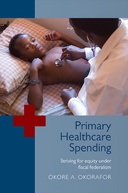Explore

The geography of healthcare financing is important in addressing inequities and inequalities in population health. This is particularly true in developing countries where there are significant disparities in socioeconomic and health status between regions. Many countries, however, are adopting a fiscal federal system, in which decision-making about the use of state financial resources is granted to lower levels of government. What impact does this have on the equitable distribution of resources to primary health care? Decentralisation has the potential to improve the efficiency of health service delivery and speed up the response to community needs, but are sufficient funds being allocated to where they are most needed? Primary Healthcare Spending highlights key factors that can help to achieve equity in the allocation of primary healthcare resources within fiscal federal systems and decentralised health systems in general. It explores a wide range of ways of spending found in fiscal federal systems around the world and how they impact on the equitable distribution of primary healthcare resources. Although South Africa is used as a case for discussion, the issues raised in the book are relevant to all countries operating under a fiscal federal system and those that operate a decentralised health system. Primary Healthcare Spending is an important reference for policymakers in health organisations, researchers in the field of health policy and health economics, agencies involved in providing support to health systems and students in the area of health administration and health policy.
This book is included in DOAB.
Why read this book? Have your say.
You must be logged in to comment.
Rights Information
Are you the author or publisher of this work? If so, you can claim it as yours by registering as an Unglue.it rights holder.Downloads
This work has been downloaded 10 times via unglue.it ebook links.
- 10 - pdf (CC BY) at Unglue.it.
Keywords
No keywords yet.Links
DOI: 10.58331/UCTPRESS.20Editions

